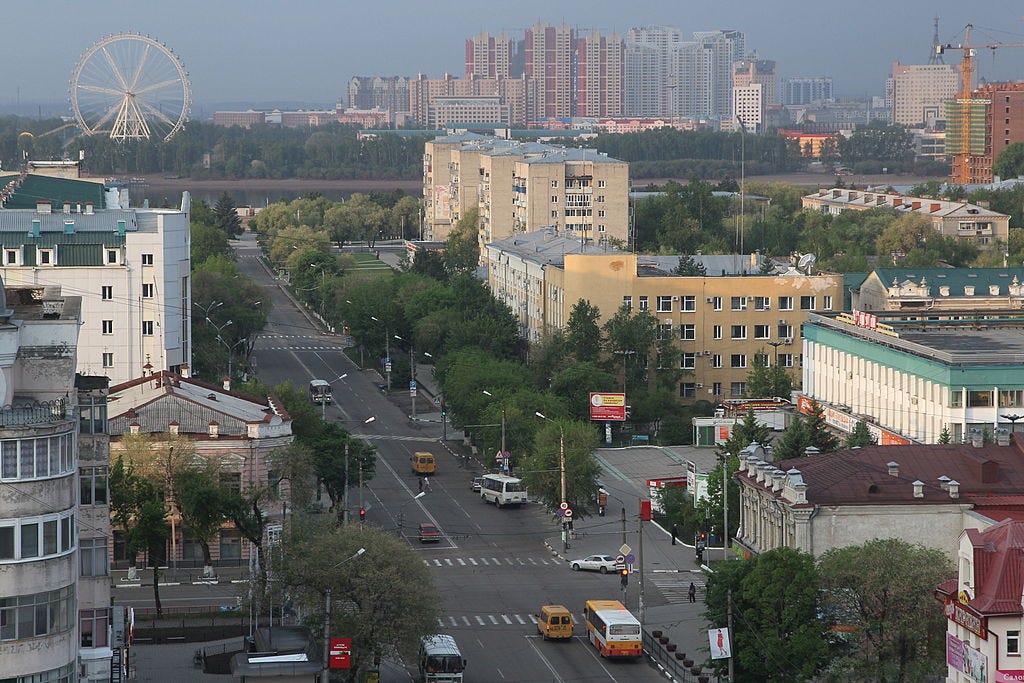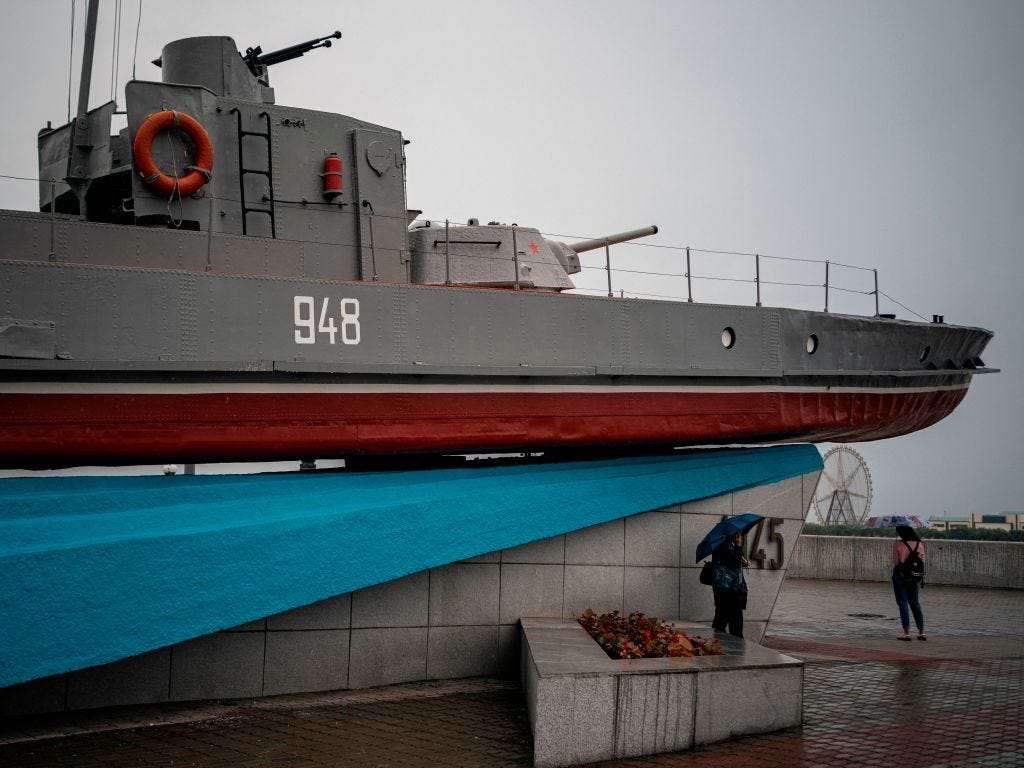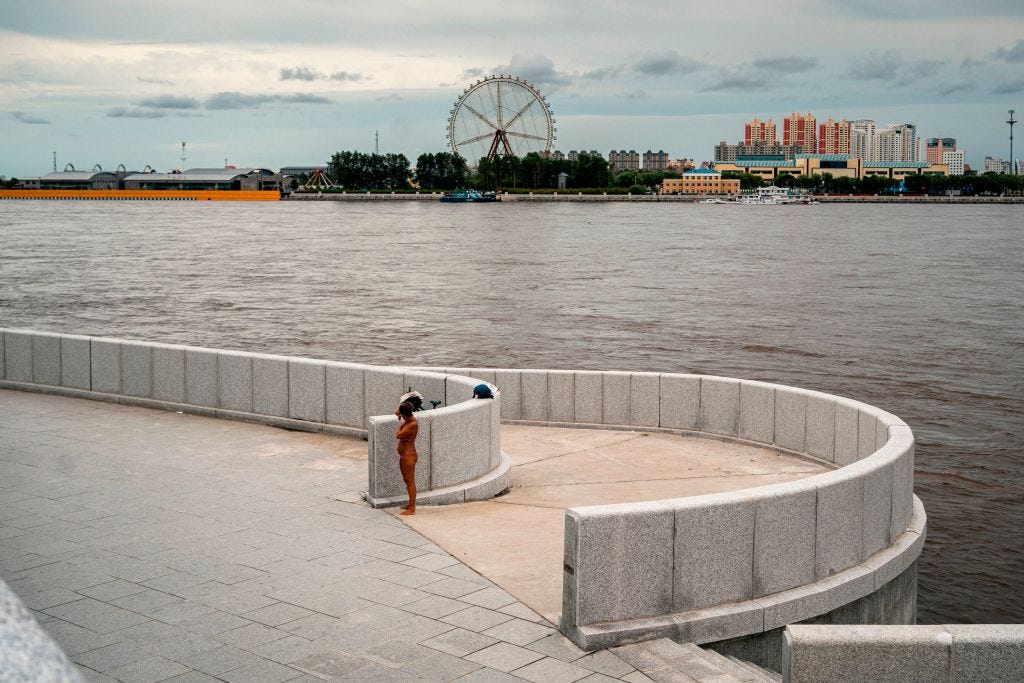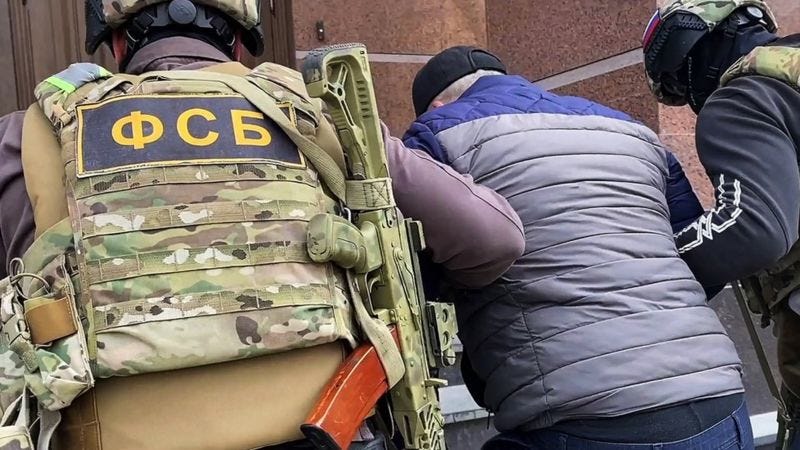'Chinese whispers'. How the FSB hunts 'spies' in Russia's Far East
Since the start of 2023, the FSB has detained at least six people in Russia’s Far East on suspicion of treason. BBC Russian details the case of two businessmen charged with spying for China.
By Sergei Goryashko and Ksenia Churmanova.

Since the beginning of 2023, at least six people in the Russian Far East have been detained by the FSB on suspicion of treason. They include two businessmen from Blagoveshchensk and Vladivostok, who have been charged with spying for China. BBC Russian has pieced together the details of this case and asks what it tells us about the way Russian special forces are increasingly targeting people they consider “traitors” and “spies”.
At 5pm on 17 February, traffic police stopped a brown Nissan Murano on a street in Blagoveshchensk, a town close to the Chinese border. Local entrepreneur Ivan Lukin, 37, was behind the wheel.
He was taken to the local police first, before being sent straight to court. Lukin spent the next 10 days in a remand prison, charged with swearing in public. Judges in Blagoveshchensk and the Amur district considered this an act of “petty hooliganism.”
As the BBC has reported, since the start of the Russian invasion of Ukraine, there have been many similar cases where people are detained for minor administrative violations, only to be rearrested on far more serious criminal charges. This happened to opposition activists Ilya Yashin and Vladimir Kara-Murzа. At least five other people have ended up behind bars in this way, charge under Article 275 of Russia’s Criminal Code – high treason.
Ivan Lukin was about to become number six. He was held in Blagoveshchensk Detention Centre 1 - the BBC was able to establish this via the prison postal service. We sent a message to Ivan Alexandrovich Lukin and received a confirmation that a person of the same name had got the message.
In mid-March, stories emerged about two men in Russia’s Far East detained on charges of spying for China. Their names were given as I.A. Lukin, and S.B. Yatsenko. These reports were not officially confirmed, perhaps due to Putin’s summit with Chinese leader Xi Jinping on 20 March.
Treason cases in Russia are highly classified. Sometimes, courts do not even publish information about the conditions of arrests, as there is no legal requirement to do so.
The Telegram channels Astra and Baza, using their own sources, identified the surnames and initials of the suspects in the “Chinese Affair.”
The full name of one suspect matched the details of the same Ivan Lukin, who had been detained for ‘using obscene language’ in February. Lukin imported forklifts and car spare parts from China. The BBC found pictures on social media of the brown Nissan Murano that figured in the reports of his arrest for “petty hooliganism”.
Two months on, Lukin still has no access to a phone, and his business partners claim, evasively, they have “lost touch” with him.
In Vladivostok, the BBC tracked down 45-year-old entrepreneur Sergei Yatsenko, named along with Lukin in the “Chinese Affair.” Contacted by the BBC, Yatsenko’s acquaintance claimed he was “in prison,” but did not say where or on what charges.
Through the prison postal service, the BBC confirmed that Yatsenko was being held in a Vladivostok detention centre. “Astra” channel then agreed to share the numbers of Lukin and Yatsenko’s criminal cases with the BBC – both were initiated in 2023.
BBC is blocked in Russia. We’ve attached the story in Russian as a pdf file for readers there.
What’s strange about Lukin’s arrest for “obscene language?”
It’s unclear where Lukin was taken on 17 February. Suspects in cases of treason are usually locked up for petty hooliganism and then moved to a pre-trial detention centre as if already charged with a criminal offence. They are released, before being rearrested by police at an airport, train station, or border crossing.
Blagoveshchensk is a border town on the Amur river, opposite the Chinese city of Heihe. A steady stream of boats and a motor bridge connect the two cities, which were separated during the pandemic.

At about the same time that Lukin and Yatsenko were arrested for treason, traffic between the two towns finally resumed. The 10 February marked the end of the China’s Covid “Red Zone” travel restrictions, Russians were allowed to start travelling across the bridge again. According to Astra and Baza, the FSB opened the espionage charge against Yatsenko on 13 February. Four days later, Lukin too was behind bars.
It’s possible to find some details of the initial case against Ivan Lukin in official court record. According to these, Lukin had to wait for both the “victim” and the “witness” of his case to arrive for the hearing. He told the court that had encountered the “victim” – an unknown man in a sports coat – on the day of the incident, in a courtyard where he had parked his car.
The “victim” had got in Lukin’s way, deliberately cutting in front of him and shoving him with his shoulder. Lukin grew angry: “What’s your problem, mate, are you too big?” He told the court that he had then apologised, got into his car, and drove away.
The “victim” told the story the other way round; Lukin had “deliberately shoved” and sworn at him. The “witness”, claiming to have been in the courtyard at the time, confirmed this version. He claimed it was Lukin who started using “obscene language.” Apparently, there was no fight.
The testimonies of the “victim” and the “witness” contradicted what they had initially told the police, judging from the verdict. The “witness” changed the time of the incident from 12:30 to between 2 and 4pm. The “victim” first filed a written complaint that Lukin threatened him “with physical violence” while later could not recall anything about it. But a judge ruled these discrepancies were "negligible", "of no relevance to the case” and “did not exonerate Lukin.” She sentenced him to ten days in prison.
The case moved to the high regional court, where its contradictions did not seem to trouble the judge. Lukin’s lawyer tried to appeal, insisting his client was a father of two and his family’s sole breadwinner, but the judge dismissed it, ruling that the sentence was proportionate and fair.
Ten days’ detention was an unprecedented punishment in this court for such an offence. Even drunks arrested for violating public order in a government institution; swearing, shouting, and making obscene gestures – are only given three days.
Lukin was due to be released on 27 February. When the BBC called Lukin’s lawyer, Ivan Sapunov, he was not aware that his client was potentially facing a new charge of treason. The lawyer would not talk to the BBC about his client and said “had not kept” the contact details of his relatives.
Heihe and the Chinese connection
According to the Baza Telegram channel’s reports on the case, Lukin is accused of being recruited as spy in 2013. Both Baza and Astra claimed that Lukin then “established secure cooperation” with a Chinese secret service operative called Yan Shiheng.
Before the pandemic, Russians could visit the free trade zone in Heihe without visas. Locals went there for shopping, leisure, and Chinese dentistry. Both the Russians and the Chinese sometimes swam the Amur river from one city to another, for sport but also illegal migration.
Lukin was in Heihe during the 2010s, when he and his partner founded several companies to import Chinese goods. “Asia-Special-Import” was the most important, and Lukin was its co-owner and commercial manager. He was open about his contacts, advertising vacancies in his company online, and selling Chinese spare parts.

Telegram channels report that a man called Yan Shiheng, considered a member of the Chinese security services by the FSB, worked in Heihe until at least the mid-2010s.
“Going to Heihe? Keep these useful numbers!” local media advised Amur residents planning a trip to China.
One of the numbers recommended to “save on your phone, tuck into your passport, or write on a scrap of newspaper” belonged to Yan Shiheng. He visited Russia as a part of an official delegation, whilst he and other Chinese officials in Heihe hosted Russians.
Yan Shiheng was also the head of the Heihe centre for settlement of foreign citizens, ensuring their rights and interests.
In 2013, Amur local newspapers, following official guidance, advised Russians in trouble to call Yan Shiheng, or his deputy, Sun Yin Yu. Their phone numbers were printed many times, with their Russified names indicated in brackets: Yan Shiheng went by “Anatoly” and Sun Yin Yu was “Grigory.”
The BBC called Yan Shiheng, who said he did not remember Lukin or Yatsenko but said he “had many Russian acquaintances.” He wouldn’t answer further questions.
Sun Yin Yu did not answer.
But in February, Heihe’s mayor Zhang Enlang was sentenced to 20 years in prison for taking bribes. The construction of the Heihe-Blagoveshchensk crossing, a joint project with Russia, began during his rule.
Radio Liberty linked the contractors for this project with pro-Russian Ukrainian politician, Victor Medvedchuk, considered close to President Vladimir Putin. Medvedchuk was captured in Ukraine and later exchanged for Ukrainian prisoners in a swap with Russia.
In January 2020, Yatsenko was allegedly “taken to China” by Lukin. Baza and Astra’s informers described the two as acquaintances. It is not clear what “taken” means, but the date of the trip definitely raises questions. At that time, the bridge between Blagoveshchensk and Heihe was still incomplete, and the Chinese border had been closed due to Covid since the beginning of 2020.
Between January and June 2022, Lukin’s “acquaintance” was allegedly gathering secrets about Russia’s nuclear weapons and passing them to the Chinese, Baza and Astra reported. In June 2022, the 19 billion rouble (£192 million) worth Blagoveshchensk-Heihe crossing was finally opened.
However, the quarantine was still in place and Russians could go no further than the border checkpoint, where they could transfer goods to the Chinese side, or receive them. This went on until February 2023.
What did Lukin’s colleagues say about his disappearance?
Lukin is still listed as the commercial manager of “Asia-Special-Import,” but his colleagues refused to comment on his fate.
“Oh no, I’m not in touch with him!”, the assistant manager told BBC.
“Where did you get this information from? I don’t know who we are talking about, nothing like this happened in ‘Asia-Special-Import’”, Yevgeny Karpunin, CEO of the company, told BBC.
He said the reports of Lukin’s arrests for administrative violations and treason were fake news.
“A lot of applications were written about this to all services, to the prosecutor”, he said, without clarifying.
Karpunin claimed that Lukin was now free, but declined to pass his contacts to BBC.
Sales manager Elena Kolmykova said she did not know how to reach Lukin and hung up.
Dmitry Orlov, manager of two other company branches, told the BBC that Lukin was “out of contact”.
He threatened to sue BBC reporter for spreading false information. Another colleague read a message requesting confirmation of his arrest for treason but did not answer and blocked the journalist.
A BBC journalist called Lukin’s colleagues undercover, as a former customer, and was told he was allegedly on a business trip with a poor mobile signal and unable to respond. They would not say when Lukin was returning to work.
Lukin’s relatives ignored BBC requests.
What do we know about Yatsenko?
Telegram channels Baza and Astra have carried conflicting reports about the case against Yatsenko. Their initial reports said he was collecting nuclear secrets for China in 2022.
But after investigators charged that Lukin had taken Yatsenko to China in 2020, Baza and Astra claimed that Yatsenko already had information “on military matters”.
There is no confirmation of these reports in other open sources.
The BBC found a garage in Vladivostok where Yatsenko used to take cars for repairs.
“He flew to Kamchatka and the Kuriles, fished, bought cars, sold them. We repaired the cars,” said a garage worker, whose name is withheld for safety reasons.
He identified Yatsenko from a social media photo and told the BBC that he was “in jail,” citing mutual friends.
He did not know when Yatsenko was arrested.
A source told BBC that before his arrest, Yatsenko was mobilised [into the military to be sent to the war in Ukraine]. He was in touch with Yatsenko on social media and saw photos of him in uniform.
“I said, what’s this, did you get called up? He said, yes,” a source said.
The BBC could not confirm this information.
According to the SPARK database, Yatsenko has co-owned several now liquidated companies since 2005, in a motley assortment of businesses – everything from fishing, construction and trading vehicles to the extraction of precious metals and mineral ores.
In May 2011, Yatsenko and his business partner, Mikhail Shipitko, were charged with smuggling as part of an “organised group” before Vladivostok district court.
The verdict is not published on the court’s website but judging by their photos on social media shortly afterwards, neither of them were sent to prison.

Shipitko refused to talk about his former partner with the BBC, saying they had not spoken for two years.
In 2018, a man whose name matched that of Yatsenko’s was sued in Vladivostok, by Dao Yin – probably a Chinese citizen - whom Yatsenko owed at least 500,000 roubles (£5,000). There is no data available on the outcome of the lawsuit.
How the media mixed up the regions in the treason case
Stories about espionage cases in Russia tend to trickle into the media. If the details are not made public by relatives or defence lawyers, the first outlets to cover the story either work directly for the state or receive information from the security forces. These reports are not always reliable.
The first reports of a new espionage case were released by the Kremlin-backed National Media Group, run by Putin’s alleged girlfriend, Alina Kabaeva. These reports were confusing, putting one person detained in two places at once – Primorsky region, and Amur region.
On 10 March, the daily newspaper Izvestiya reported that a man collecting data on Russian nuclear weapons and passing it to foreign special forces had been arrested in Primorsky region.
Ten minutes later, the Telegram channels of Izvestiya and its sister site REN TV repeated the story, with the arrest location changed to “Amur region.” REN TV described the suspect as a “local resident.” None of the contradictory reports have been taken down.
The following day, regional outlet Amur Pravda reported that a Primorsky citizen had been arrested for collecting nuclear secrets. The mix-up could be a result of the very similar nicknames of the two regions “Priamurye” and “Primorye.”
However, whilst Izvestiya reported the arrest of one suspect, there were two. Baza and Astra were the first to name the Primorsky spy as S.B. Yatsenko – and two weeks later, they named the second spy, I.A. Lukin. Lukin was also described as a “Primorsky citizen.”
All five outlets sourced the report on “data from the investigation”.
The Primorsky and Amur courts have not released details of espionage trials since February. The BBC was informed that neither Yatsenko nor Lukin were taken to Moscow’s Lefortovo court. Treason suspects from the regions are usually brought there, where they may petition the FSB for bail.
Primorsky Regional Court and the Pacific Naval Military Court press services told the BBC that neither Yatsenko nor Lukin had been considered for bail.
Several courts in the Amur region refused requests from the BBC.
“As the BBC is an outlet of a country hostile to the Russian Federation, media cooperation is out of the question until relations between the two countries return to normal,” wrote Alexander Voronin, press secretary of Blagoveshchensk city court.
The BBC is waiting for an FSB response.
Yatsenko is still in Vladivostok detention centre, and Lukin is in Blagoveshchensk. Not many details are known about the espionage charges they are facing.
Two trials for the price of one
There is nothing on the social media profiles of the two men to prove that they are connected. Nobody with the surname Yatsenko appears among Lukin’s friends on social media. It is unclear whether Yatsenko’s business was connected to China in the same way as Lukin’s.
It is not uncommon to have two connected defendants in one treason trial. In September 2022, journalist Ivan Safronov was sentenced to 22 years in prison under maximum security. He was accused of passing information to foreign intelligence, although he worked as a journalist for most of his career and had no access to state secrets.
Seven months after Safronov’s arrest a political scientist called Demuri Voronin was arrested and accused of receiving secret information from Safronov. Although the charges were widely discredited and Voronin retracted his confession in court, he was given a 13 year prison sentence for treason.
Other high treason cases in Russia’s Far East during the Ukraine war
The Lukin-Yatsenko prosecution is by no means the first treason case in the Russian Far East.
In March 2022, the FSB arrested a Khabarovsk resident, claiming that he had had access to classified information which he had offered – but ultimately failed – to transfer to Ukrainian intelligence.
In September 2022, 50-year-old Dmitry Kulikov from Vladivostok was accused of photographing bridges and other structures in the city for Ukrainian intelligence. [The name was provided by OVD info, recognised as a foreign agent in Russia.]
Kulikov’s relative told the BBC that the family wanted no publicity and would not support him. There is no information about this case in judicial records.
In March 2023, the FSB detained another man in Khabarovsk region for “sending data to a member of Ukrainian intelligence regarding Russian military objects with the potential to be used in sabotage attacks; precision weapon and UAV strikes in areas used for loading, maintaining, and transporting military equipment,” TASS press agency reported.
In March and April, two Russians were arrested in Khabarovsk under suspicion of financing the Ukrainian army. They have not been named, but BBC has information that one suspect was a member of a group campaigning on behalf of the now jailed mayor of Khabarovsk, Sergei Furgal.
The FSB shared a video of a woman being taken to Moscow by plane.
Also in April, the FSB took a Sakhalin resident into custody for preparing to join the Ukrainian army. He is yet to be named.
Yevgeny Smirnov, a lawyer for the human-rights group “Perviy Otdel” (First Department) which helps people accused of treason, said that from 2022 onwards, the FSB started giving more power to regional courts.
The regions are encouraged to handle cases themselves when the charges involve “defecting to the enemy,” although suspects are still sent to Moscow if charged with “passing secrets overseas.”
That is why some suspects are left in detention centres in the provinces, whilst others are sent to Lefortovo in Moscow. Smirnov estimated that most “secrets overseas” cases are handled by the FSB head office in Moscow.
There are three regional departments entrusted to work on such cases – the FSB criminal branches for the Moscow region, and the Krasnodar and Primorsky districts.
Espionage suspects are sometimes denied bail in their home regions before being sent to Moscow.
This happened to Valery Kachin, who was, in October 2022, locked up for treason in a detention centre in Birobidzhan (Jewish Autonomous Oblast in the Far East), before being transferred to Moscow in December.
China figures high in Russian espionage cases
Statistics for espionage cases over the past two decades show that China, along with the US and Gеоrgia are the three main countries for whom Russian citizens are most often convicted of spying. Out of a total of 118 treason cases, 14 involved passing state secrets to the Chinese, Kommersant daily reported in 2019.
In 2004, Igor Igorevich Lukin [no relation] a former army officer, was arrested for attempting to spy for China. The court accused Lukin and the businessmen Alexander Beloshapkin and Viktor Popov of trying to send documents – including a textbook for pilots – abroad.
These documents were assumed to be secret, but may not have been. Several people were also indicted.
Popov killed himself in his cell before a verdict was reached.
Scientists are also regularly accused of spying for China. Krasnoyarsk physicist Valentin Danilov received a 13-year sentence in 2005, and two professors at the Baltic State Technical University were given similar sentences in 2012.
Vladimir Lapygin of the Central Research Institute of Mechanical Engineering got seven years imprisonment in 2016 for passing information to China.
In 2020, Arctic Academy president Valery Mitko was also accused of treason. Mitko visited China twice between 2016 and 2018, to give lectures at Dalian University.
He allegedly “smuggled in his suitcase” a document about Russian submarines. Mitko said he had used open sources and needed the document for his lectures.
He spent almost two years under house arrest, which was only lifted in 2022 when the 81-year-old scientist died.
Alexei Vorobyov of the Moscow Aviation Institution was given a 20-year sentence as an alleged Chinese spy in 2021.
“First Department” lawyers who defended Vorobyov said he had allegedly tried to send an old aircraft’ control panel to China, upon request from an undercover FSB agent.
A photo of an old abstract containing Russian state secrets was then found on the scientist’s phone, whilst the SIM card contained traces of “Chinese dust.”
In February 2022, Primorsky district court sentenced “Prisoner K” to 12 years for treason on charges of “passing information about the sonar detection systems of submarines to a foreign agent.”
The BBC estimates that there have been at least 26 treason cases since the beginning of 2023, already exceeding the total for 2022.
The FSB has opened four new cases in the one week alone, publishing the initials and surnames of suspects.
Lefortovo court refused to give the BBC the full names of those who were jailed.
Under Article 275, the maximum penalty for treason was 20 years.
On 28 April, Vladimir Putin changed this to a life sentence.
Read this story in Russian here.
Translated by Pippa Crawford.
Edited by Aleksandra Niksic.
Can air forces play a bigger role and turn the tide in the war in Ukraine?
By Pavel Aksenov, Defense Correspondent Ukraine has for a long time been requesting modern military aircraft from its Western partners, especially now, as Kyiv gears up for a counteroffensive. Many military bloggers in Russia warn that Ukraine’s modern air …







